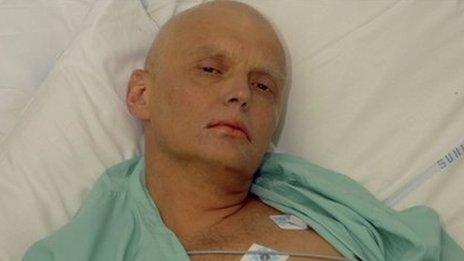Litvinenko, courts and secrecy
- Published
- comments
The government has successfully won a court order blocking the release of secret information in relation to the death of the former KGB spy Alexander Litvinenko.

Alexander Litvinenko fell ill after a meeting with former KGB contacts in London in 2006
It is the latest legal twist in what is becoming an ever-more complicated legal fight between his widow, the proposed coroner and ministers over what should or should not be made public about the nature of his death.
At the moment, the affair is in something of a limbo as the differing sides slug it out in the courts - so this judgement today is by no means the final word. But it is nevertheless quite revealing of how far the senior judiciary will go to protect information which ministers say cannot be disclosed.
To recap, the 43-year-old died in London seven years ago after he was poisoned with radioactive polonium while drinking tea with two Russian ex-KGB officers.
The death - and the allegation that Moscow orchestrated a miniature act of radioactive terrorism in London - has caused considerable damage to relations with Russia.
Moscow has refused to extradite the prime suspect and Sir John Sawers, the head of MI6, recently told MPs that the two countries have not talked on intelligence matters since.
Under English law, there should always be an inquest into an unexplained death - and inquests are supposed to be a full and public examination of the circumstances.
Just over a year ago Sir Robert Owen, the coroner for the proposed Litvinenko inquest, confirmed that the hearings would look at Russia’s involvement in the death.
The only problem is that would inevitably involve matters of state security - and that is precisely the kind of information that is supposed to be kept secret in the national interest.
Nevertheless, the coroner’s team and government officials began working out which secret documents should be aired in a process called Public Interest Immunity (PII).
The long-standing PII system allows ministers to tell judges that a document cannot be disclosed because there is a public interest in keeping it under lock and key.
An obvious example would be a request to withhold information from a terrorism trial that reveals the identity of an informer inside a cell of extremists.
Back in February, Foreign Secretary William Hague sought PII over a raft of material relating to the Litvinenko case - we obviously do not know what that material covers.
Sir Robert ultimately accepted that request - but only in part. In a written ruling in May, external, he agreed that the government had to keep some information under wraps on grounds of national security - including information relating to Russia and whether the British security and intelligence services could have prevented the death.

Marina Litvinenko: Fighting to find out what happened
The coroner then concluded that given an inquest could not examine the sensitive material behind closed doors; there should instead be a public inquiry , externalwhich would have the power to hold secret hearings. Those hearings would exclude Mr Litvinenko’s widow, Marina, the public and the press.
The government has refused to launch a limited public inquiry, telling the coroner that an inquest would still be effective. Marina Litvinenko is contesting that, with her lawyer saying that there is increasing danger that the proceedings may never get to the truth about Russia’s role.
Wednesday’s judgement is not on that point - but on the coroner’s decision that, if his inquest were to go ahead, some of the other material should be disclosed, despite William Hague’s assertion that it should not.
As a compromise, the coroner proposed that the documents should be disclosed in a “gist” - which basically means a summary that omits the most sensitive detail.
The government refused to comply and took the case to a judicial review. It told the High Court that the coroner was profoundly wrong because the material he wanted to put in a gist was “sensitive to the highest degree”.
Three senior judges looked at the material - a sign of how serious the court took this decision - and they have now agreed that none of it should be disclosed in any form, external.
The panel included Mr Justice Mitting, arguably the most experienced judge in the country in dealing with the question of disclosing secret material.
In their ruling, the judges said that the coroner had been wrong to conclude that the need to hold a “full and proper” inquest was some kind of trump card over the government’s wishes to keep the Litvinenko material secret.
“It was clear that the narrative of the inquest would be adversely affected by non-disclosure, although that could to some extent be ameliorated,” said Mr Justice Goldring.
“Although this is not satisfactory, the essential issue is not whether or not the process of the inquest would be prejudiced by non-disclosure; plainly it would be. The question is whether that prejudice outweighs the real risk of significant damage to national security.”
In other words, the coroner had not properly taken into account the Foreign Secretary’s reasons for keeping information secret.
The judgement concluded: “The issues which we have been considering concerned the risk of significant damage to national security. Had it been otherwise, different considerations might well have applied. The outcome could well have been different. “
So the legal ping-pong over how to get to the truth continues - and the coroner has said he needs to “reflect carefully” on the judgement before deciding how best to proceed.
But that concluding paragraph from the judges is very telling about how the courts deal with state secrecy.
There have been near-apocalyptic warnings in recent years from some in government that judges were on the verge of disclosing state secrets that would compromise national security.
This judgement demonstrates the contrary. Judges remain extremely reluctant to overrule ministers who insist that there is information is so sensitive it can simply never be disclosed.
In other words, the public interest lies in keeping it from the public.
- Published7 October 2013

- Published19 July 2013
